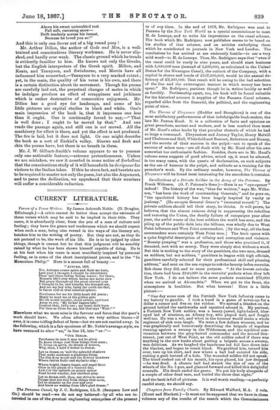CURRENT LITERATURE.
Verses of a Prose Writer. By James Ashcroft Noble. (D. Douglas, Edinburgh.)—A critic cannot do better than accept the estimate of the verses which may be said to be implied in their title. They come, it is abundantly clear, from the pen of a man of culture and feeling ; they have the grace and tenderness which we should expect when each a man, being also versed in the ways of the literary art, betakes him to the writing of poetry. But they are not, as they do not pretend to be, the work of his life. He is to be judged by other things, though it cannot bat be that this judgment will be sensibly raised by what he has here shown himself capable of doing. He is at his beet when his verse is most manifestly inspired by personal feeling, as in some of the short inscriptional pieces, and in the "In Memoriam Philip." Here is a sonnet full of beauty :— " Across, 1885.
Yes, Autumn comes again and fIncla me here. Last year I thought I should be otherwhere Than 'mid these fading falling leaves; for there, Beneath life's tree whose leaves are never sere But green throughout the great eternal tone I thought to lie, and breathe the tranquil air. And see my boy who, being for earth too fair, Is fairer still in that celestial sphere.
Perchance for me his little heart did yearn ; Haply to meet me at the golden gate He oft would wander, stand awhile, and turn Away to ory, ' My father lingers late.' Content thee, little one ; my heart cloth burn For thee as thine for me, but God says • Wait !'"
Elsewhere what we most miss is the fervour and force that the poet's work should have. We often admire, we very seldom blame—if ever, it is come toiling defect of form—but we are not carried away. In the following, which is a fair specimen of Mr. Noble's average style, we have ventured to alter "no," in line 13, into "us "Ora Durex.
Perchance to men it may not be given To know things real from things that seam; If, living on earth, we dream of heaven, Why, then, I hold it better to dream. let us dream on 'mid the splendid shadows That make existence a gladsome thing. The dim deep woods and the flowery meadows Where fairies frolic and skylarks sing; Where bright shapes linger, and angel faces Glow in the gleam of a visioned day, And o'er the uplands on grassy spaces Fond lovers wander, fair Istoldren play. Let no dream still, then, nor strive to Bever Things that me real from things that seem, Let us slumber on for ever and ever And know no waking from life's glad dream."


































 Previous page
Previous page